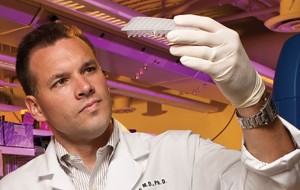Some children born with birth defects may be at increased risk for specific types of cancer, according to a new review from the Brown School and the School of Medicine at Washington University in St. Louis.
In the first systematic and most comprehensive review on the topic, Kimberly Johnson, associate professor at the Brown School, and her colleagues, including Todd Druley, a pediatric oncologist and assistant professor in the School of Medicine, analyzed articles reporting data from 80 studies conducted around the world. They found an increased risk for certain cancers among children born with birth defects.

The analysis, “Pediatric Cancer Risk in Association With Birth Defects: A Systematic Review,” was published July 27 in the online journal PLOS ONE.
More than 14,000 children in the U.S. are diagnosed with cancer each year.
Identifying and understanding connections between abnormal fetal or childhood development and cancer will have implications for personalizing the treatment of children, Druley said.

“Clear, positive associations exist between birth defects and pediatric cancer with evidence for increased risks for specific cancer/birth-defect type combinations such as central nervous system abnormalities and central nervous system cancer, rib anomalies and a number of cancer types, and genitourinary abnormalities and heptoblastoma,” Johnson said.
Advances in gene sequencing may provide even better identification of children with birth defects who are at high risk of cancer.
“This work provides a foundation for future investigations that are needed to clarify specific birth defect types predisposing toward malignancy and possible underlying causes of both birth defects and malignancy,” Johnson wrote in the paper.